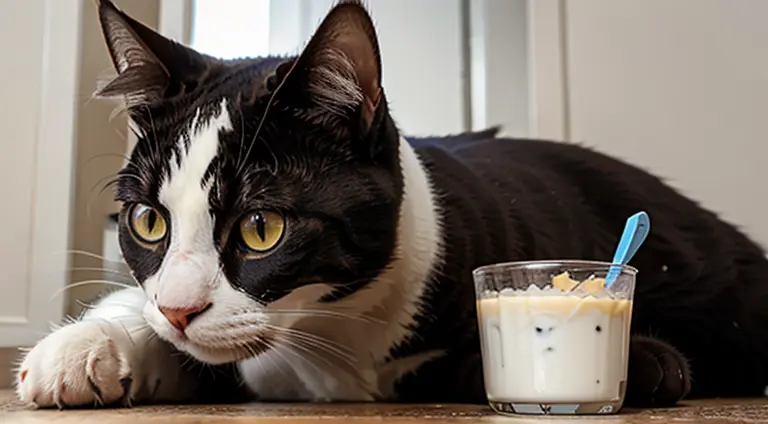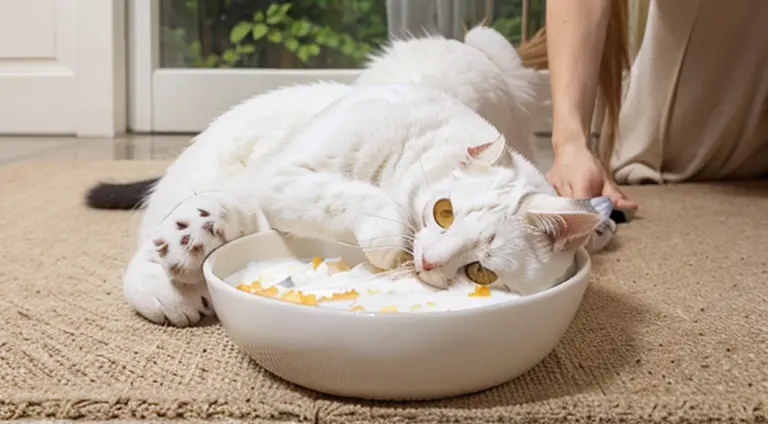Yes, cats can eat yogurt providing it’s plain and unsweetened. Although it’s true that many cats are lactose intolerant, the lactose that yogurt contains is actually easier for cats to break down, as the live bacteria within the yogurt can help your cat to break it down. However, as with other human foods, check with your vet before offering yogurt to your cat, and only ever give them small amounts of this dessert as a treat.
Can Eat Greek yogurt
Yes, cats can eat Greek yogurt in moderation. Greek yogurt can be a good source of protein and probiotics for cats. However, there are a few things to consider:
Lactose Tolerance:
While many cats are lactose intolerant, Greek yogurt has less lactose than regular milk due to the fermentation process. Still, some cats might experience digestive upset.
Plain and Unsweetened:
Always choose plain, unsweetened Greek yogurt. Flavored yogurts can contain sugars, artificial sweeteners (like xylitol, which is toxic to cats), or other additives that are harmful to cats.
Moderation is Key:
Greek yogurt should only be given in small amounts as a treat, not as a regular part of your cat’s diet.
Watch for Allergic Reactions:
Some cats may be allergic to dairy products. Introduce Greek yogurt slowly and watch for any signs of an allergic reaction, such as itching or gastrointestinal upset.
Read About:
Can Cats Eat Honey? Understand Fact
Do Cat Like Yogurt
Yes, in most cases! Yarn is tasty for cats. This occurs because their sense of smell draws them to the dairy product, which contains protein and lipids.
Weaned cats are intolerant of lactose, but that doesn’t stop them from enjoying dairy products like milk, yogurt, and cheese. This doesn’t stop an obstinate pet, just as everyone has a lactose-intolerant buddy who insists on eating pizza and ice cream nevertheless. They could feel nauseous from too much lactose, but thankfully, very little lactose is left behind after fermentation in yogurt.

Probiotics:
Yogurt is a great source of probiotics, beneficial bacteria that can improve gut health. These probiotics can aid in digestion and help in maintaining a healthy balance of gut flora.
Protein:
It’s a good source of protein, essential for muscle repair and growth. Protein also helps in maintaining a feeling of fullness, which can be beneficial for weight management.
Calcium and Vitamin D:
Yogurt is rich in calcium, vital for bone health. Some yogurts are fortified with vitamin D, which helps in calcium absorption and also plays a crucial role in immune function and cell growth.
B Vitamins:
It contains B vitamins, including B12, which are important for maintaining brain health, nerve function, and the production of red blood cells.
Potassium:
Yogurt can be a source of potassium, which is key in regulating blood pressure and balancing electrolytes.
Healthy Fats:
Some types of yogurt contain healthy fats, which are important for heart health and can help in regulating cholesterol levels.
Weight Management:
Consuming yogurt can be part of a balanced diet and may assist in weight management due to its combination of protein, fat, and probiotics.
Mental Health:
Emerging research suggests that the probiotics found in yogurt can also have a positive effect on mental health by reducing anxiety, stress, and depression symptoms.
How much yogurt can I give my cat?
You’re feeding your cat yogurt as a treat since they enjoy it. Use just plain yogurt for your cat. Avoid fruit-flavored or sugary yogurts. Yogurt with sugar replacements like xylitol is hazardous to cats, so avoid it.
How much yogurt can your cat eat without harm? Avoid feeding your cat more than three to five teaspoons every week. Try adding a little to their diet once a day.
Consider utilizing the 90/10 rule: 90% of their calories should come from cat food and 10% from treats. Plain yogurt has 11 calories per spoonful. Find out how many calories your cat needs with this Pet Nutrition Alliance calculator.
Before feeding your pet any new food, consult your vet. If your cat vomits or has diarrhea after eating yogurt, they may be allergic
Conclusion
To summarize, yogurt consumption relies on personal diets. Protein, calcium, and microbes in yogurt support digestive health and bone strength. Since fermentation lowers lactose, it’s acceptable for most people, even lactose intolerant ones. Traditional dairy-based yogurt may be unsuitable for vegetarians and individuals with dairy allergies. Plant-based yogurt is accessible for dairy-free people. Remember to pick yogurts with minimum added sugars and artificial additives for maximum health benefits. For individualized nutrition guidance, see a doctor or dietician.
FAQs Section
- Is it safe for cats to eat yogurt?
- Yes, most cats can safely eat small amounts of plain, unsweetened yogurt. However, it’s important to remember that cats are lactose intolerant, so they may have difficulty digesting dairy products. Yogurt with active cultures can be easier for them to digest due to the presence of beneficial bacteria.
- What are the benefits of feeding yogurt to cats?
- Yogurt can provide probiotics which may help with digestion and gut health. It also contains nutrients like calcium and protein. However, these benefits should be weighed against the potential for digestive upset due to lactose intolerance.
- How much yogurt can I feed my cat?
- Yogurt should only be given as a small treat, not a regular part of their diet. A teaspoon or two is typically enough for a cat. Always start with a very small amount to see how your cat reacts.
- Are there any types of yogurt that are harmful to cats?
- Avoid feeding your cat flavored yogurts, as they often contain added sugars and artificial sweeteners like xylitol, which is toxic to cats. Stick to plain, unsweetened yogurt, and ensure it doesn’t contain any additives or preservatives.
- Can yogurt help a cat with digestive issues?
- While yogurt’s probiotics can aid digestion, it’s not a cure for digestive issues. If your cat is experiencing persistent digestive problems, it’s crucial to consult a veterinarian. Yogurt should not replace professional treatment or prescribed medication.

